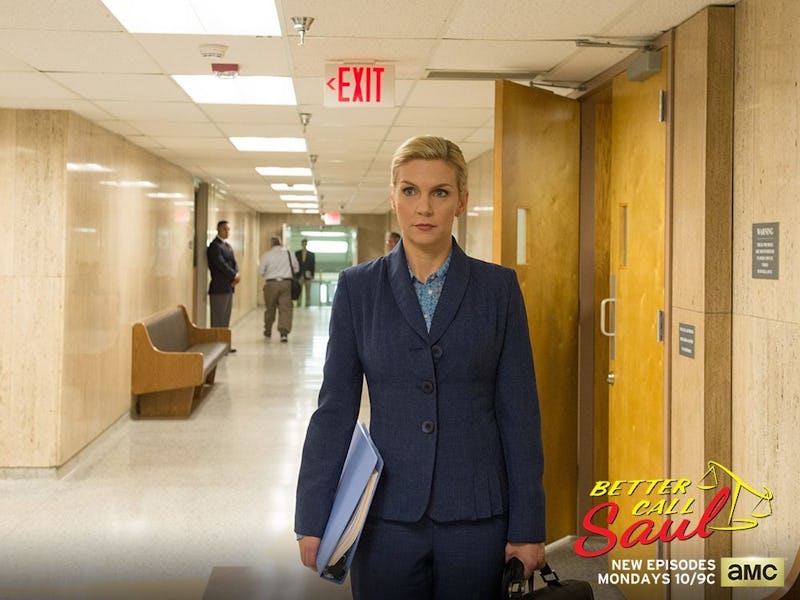'Better Call Saul' is Becoming a Triple-Threat Drama
In 'Bali Ha'i,' Kim emerges as the third piece of the show's increasingly intricate puzzle.

After Hector Salamanca’s (Mark Margolis) surprise threat to Mike (Jonathan Banks) last week, the doors of Better Call Saul were blown open; and its connection to the darkness of Breaking Bad became more pronounced. It might have been there from the start — and may be what fans wanted all along — but the writers are smarter than that. While Mike’s unfortunate run-ins with Tuco (Raymond Cruz) and now Tio may soothe audiences into feeling like old times, that plotline really feels like the Breaking Bad prequel that many expected for this show. Yet one of the best things about Better Call Saul is the way it subverts the expectations of those who wanted a show about Walter White before he was Walter White. It’s doing everything at once, and still changing.
“Bali Ha’i” revolves around a string of tête-à-têtes: Characters sitting or standing opposite one another leveraging their own personal feelings. But it’s also an episode about discovery. Better Call Saul began with the idea of Jimmy’s (Bob Odenkirk) eventual transformation into Saul Goodman, and still swirls around him as the nucleus, but the show has now created a triple-threaded drama.
It almost immediately paired the contrasting, but still immoral, narrative strands of Jimmy and Mike for good measure, but “Bali Ha’i” has presented a third. Chuck (Michael McKean) was always a possibility, but for now, he’s just a well-shaded foil. It’s Kim (Rhea Seehorn) who’s become the rightful third variable in the show’s winning equation.
Newly restored in her standing at the HHM office after neglecting to tell the still-miffed Howard (Patrick Fabian) of Jimmy’s Davis & Main TV commercial stunt, she puts up a good solitary fight at a routine Sandpiper hearing. She catches the eye of Rich Schweikart (an icy and effortless Dennis Boutsikaris), the namesake and senior partner of rival firm Schweikart & Cokely. He eventually offers her a job while sipping a Moscow Mule over lunch, and the clearly vulnerable Kim (and the audience) can’t decide whether Schweikart actually believes in her innate abilities, or whether he’s simply trying to maneuver some pressure on the opposite side of the courtroom.
Kim finds herself, like Chuck, as a foil for Jimmy. But it resonates more because we see her empathize with Jimmy’s plight of being constantly overlooked. Spurred by Jimmy’s semi-pathetic, but endearing rendition of the episode’s title song from South Pacific he sings into her answering machine, she evades her office babysitter, Julie, to rival Jimmy’s own horrifically cheery taskmaster Erin, and books it to the nearest bar for a soul-searching Moscow Mule of her own. When she sees a chance to dupe some rich womanizing engineer by slipping into her alter ego Giselle, she takes it. She calls in Jimmy to play her fictitious brother Viktor, and they eventually con $10,000 out of the guy for their phony startup, “Ice Station Zebra Associates.”
Besides being a great callback to Episode 3, it aligns Kim with Jimmy’s own need to be free from the burden of responsibility. Slippin’ Jimmy can use some help from Slippin’ Kimmy, too. “I keep thinking of you floating in that pool,” she says of their previous Giselle and Viktor con from Episode 1. “You knew what you wanted.”
The authoritative tables have turned. “I’m good, I got what I wanted,” Jimmy says to her about his move to Davis & Main. “You with the Schweikart thing, you could have everything you ever wanted. What’s not to love about that?”
Jimmy is trying to do the right thing by encouraging her. But even he knows that fulfilling your wildest dreams doesn’t necessarily solve all your problems.
Speaking of problems, we’d be remiss not to mention the reappearance of Hector’s twin nephews Marco (Luis Moncada) and Leonel (Daniel Moncada), seen ominously threatening Mike and his granddaughter Kaylee — and years away from meeting their grisly fate at the hands DEA agent Hank Schrader in one of Breaking Bad’s most harrowing scenes. It forces Mike to (reluctantly) agree with Hector to take the fall for Tuco’s gun charge, but for a price: the $50,000 he would have gotten if he’d killed Tuco in the first place.
“You willing to die for this?” Hector wonders, unfazed. “Maybe I need the $50,000 more than you do,” Mike replies.
Where will each of the three main narrative threads draw the line in their personal pursuits? More importantly, which side will they be on when all is said and done? I think we roughly know the answers for Jimmy and Mike, but will Kim be the character who forces their decisions? We’ll just have to keep watching to find out.